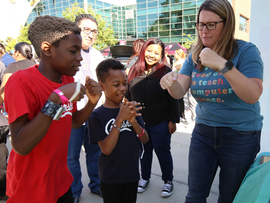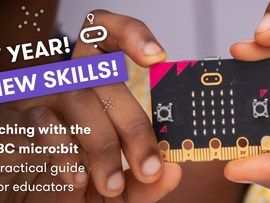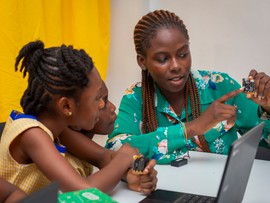BBC micro:bit playground survey - the results
The BBC micro:bit – the next gen campaign reveals the results of our playground survey, using data collected by school children from across the UK.

Throughout the spring and summer terms of 2024, the BBC micro:bit playground survey ran as an exciting investigation to help children aged 7 - 11 get to grips with data science in a fun and practical way. Working with the Office for National Statistics (ONS) to analyse the data that students collected, the final results include data from 202 classes across 156 schools across the UK. We want to thank teachers from all over the country for encouraging your students to in get involved in this pioneering survey. From measuring differences in surface temperatures to counting biodiversity, students got to see playgrounds in a whole new way.

Activity levels results
As part of ‘Tracking our physical activity’, pupils wore their micro:bits to track their physical movements during their break and lunch time. Over 800 students submitted data on their movements.
On average, pupils spent:
- 54% of their break times stationary
- 32% of their break times in low intensity movement e.g. walking
- 7% of their break times in moderate intensity movement e.g. running
- 6% of their break times in high intensity movement e.g. jumping
Activity levels and weather
We compared the activity levels from the micro:bit playground survey to weather data from Meteorological Office (MET office). According to their Spring Assessment, spring 2024 was both wetter and had less sunshine than average for most of the UK, barring some regions of Scotland.
The BBC micro:bit playground survey found that overall, students were less active in wet weather than in dry weather.
To help analyse the movement data collected by the micro:bit, activity levels were broken down into the following categories:
- Inactive = sitting down or standing still, including time eating lunch, participating in creative play, or socialising
- Low intensity = activities like walking
- Mid intensity = activities like running
- High intensity = activities like jumping
When comparing activity levels between wet and dry weather, the average proportion of time spent being inactive was 8% higher during wet weather. Students did low intensity movement for 6% less time, mid intensity movement for 2% less time and high intensity activity for 1% less time on rainy days compared with dry.


How does this impact children?
To investigate this further, BBC Education commissioned a survey with 500 primary school teachers.
The survey highlighted the importance of outdoor play for children's mental and physical health, as well as social skills, with feedback showing that children seem happier, more focused, and better behaved after playing outside. On the other hand, poor weather means children stay inside during break times (also known as ‘wet play’) and teachers report a negative impact.

There is something about being able to run around, which makes them come back to class, they sort of reset. They're ready to learn. So, when they don’t have that, the thing I notice most is that their behaviour and their mental health just take a dive.

Primary teacher
What next?
The BBC micro:bit – the next gen campaign is a partnership between BBC Education, the Micro:bit Educational Foundation, and Nominet, as well as other tech and education partners. Over 90% of UK primary schools signed up to receive free BBC micro:bits for their classrooms.
The BBC micro:bit playground survey has given children an incredible opportunity to build digital literacy in an entirely new way, which will be hugely important for their future.

As computing technologies and AI systems deeply impact our children's lives and futures, it's our goal to excite and educate young learners, so they're equipped with the digital skills and the thinking skills that they need as they grow up in the 21st century.
By embedding the technology of the micro:bit device into the playground survey, pupils took computing off the screen and into their hands. This curriculum-relevant learning has given young children playful, accessible introductions to data science and machine learning - two major areas fundamental to understanding Artificial Intelligence.

Magda Wood, Chief of Learning, Micro:bit Educational Foundation

I can’t stress enough how important projects like this are. They spark curiosity and show children the real-world applications of data, laying a foundation that will serve them well as they grow into adulthood.
Data literacy is no longer just a skill for specialists; it’s an essential part of understanding and navigating the modern world. And what better way to introduce these concepts than through something as familiar and fun as playtime?

Mary Gregory, a Director of the Office of National Statistics
For more information...
Explore all the results and take part in the interactive quiz on the BBC’s website. If you feel inspired to try out the activities and discover your own data, you can find all the classroom resources and tools there too.


